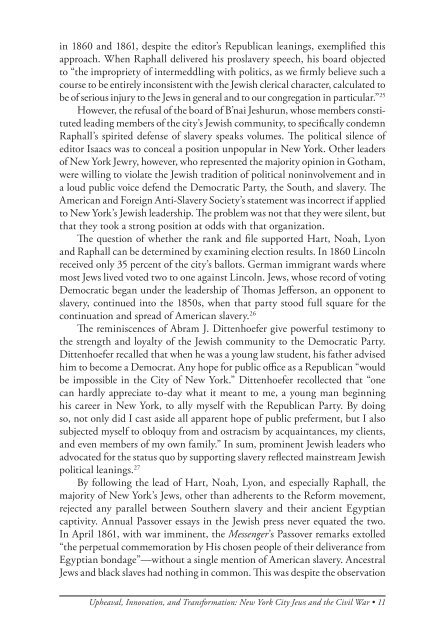American Jewish Archives Journal, Volume 64, Numbers 1 & 2
American Jewish Archives Journal, Volume 64, Numbers 1 & 2
American Jewish Archives Journal, Volume 64, Numbers 1 & 2
Create successful ePaper yourself
Turn your PDF publications into a flip-book with our unique Google optimized e-Paper software.
in 1860 and 1861, despite the editor’s Republican leanings, exemplified this<br />
approach. When Raphall delivered his proslavery speech, his board objected<br />
to “the impropriety of intermeddling with politics, as we firmly believe such a<br />
course to be entirely inconsistent with the <strong>Jewish</strong> clerical character, calculated to<br />
be of serious injury to the Jews in general and to our congregation in particular.” 25<br />
However, the refusal of the board of B’nai Jeshurun, whose members constituted<br />
leading members of the city’s <strong>Jewish</strong> community, to specifically condemn<br />
Raphall’s spirited defense of slavery speaks volumes. The political silence of<br />
editor Isaacs was to conceal a position unpopular in New York. Other leaders<br />
of New York Jewry, however, who represented the majority opinion in Gotham,<br />
were willing to violate the <strong>Jewish</strong> tradition of political noninvolvement and in<br />
a loud public voice defend the Democratic Party, the South, and slavery. The<br />
<strong>American</strong> and Foreign Anti-Slavery Society’s statement was incorrect if applied<br />
to New York’s <strong>Jewish</strong> leadership. The problem was not that they were silent, but<br />
that they took a strong position at odds with that organization.<br />
The question of whether the rank and file supported Hart, Noah, Lyon<br />
and Raphall can be determined by examining election results. In 1860 Lincoln<br />
received only 35 percent of the city’s ballots. German immigrant wards where<br />
most Jews lived voted two to one against Lincoln. Jews, whose record of voting<br />
Democratic began under the leadership of Thomas Jefferson, an opponent to<br />
slavery, continued into the 1850s, when that party stood full square for the<br />
continuation and spread of <strong>American</strong> slavery. 26<br />
The reminiscences of Abram J. Dittenhoefer give powerful testimony to<br />
the strength and loyalty of the <strong>Jewish</strong> community to the Democratic Party.<br />
Dittenhoefer recalled that when he was a young law student, his father advised<br />
him to become a Democrat. Any hope for public office as a Republican “would<br />
be impossible in the City of New York.” Dittenhoefer recollected that “one<br />
can hardly appreciate to-day what it meant to me, a young man beginning<br />
his career in New York, to ally myself with the Republican Party. By doing<br />
so, not only did I cast aside all apparent hope of public preferment, but I also<br />
subjected myself to obloquy from and ostracism by acquaintances, my clients,<br />
and even members of my own family.” In sum, prominent <strong>Jewish</strong> leaders who<br />
advocated for the status quo by supporting slavery reflected mainstream <strong>Jewish</strong><br />
political leanings. 27<br />
By following the lead of Hart, Noah, Lyon, and especially Raphall, the<br />
majority of New York’s Jews, other than adherents to the Reform movement,<br />
rejected any parallel between Southern slavery and their ancient Egyptian<br />
captivity. Annual Passover essays in the <strong>Jewish</strong> press never equated the two.<br />
In April 1861, with war imminent, the Messenger’s Passover remarks extolled<br />
“the perpetual commemoration by His chosen people of their deliverance from<br />
Egyptian bondage”—without a single mention of <strong>American</strong> slavery. Ancestral<br />
Jews and black slaves had nothing in common. This was despite the observation<br />
Upheaval, Innovation, and Transformation: New York City Jews and the Civil War • 11
















